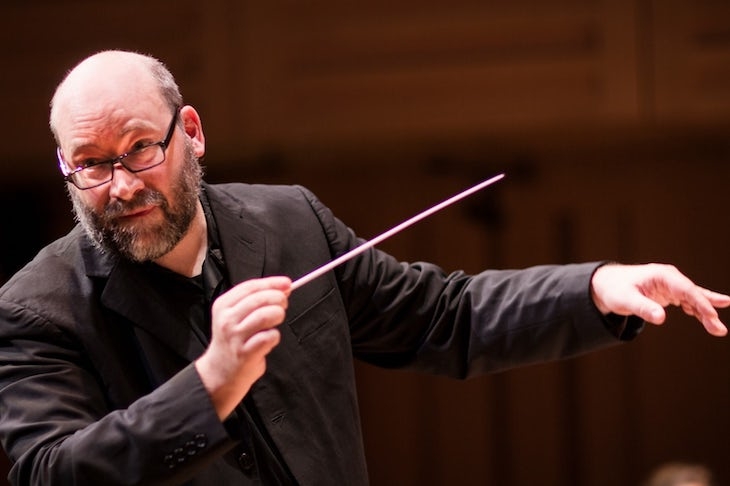‘All fish in flood and fowl of flight/ Be mirthful now and make melody’ writes the poet William Dunbar in the verses that Sir Charles Hubert Parry set to music as Ode on the Nativity. In David Matthews’s new Ninth Symphony, one particular fowl does exactly that. The symphony’s central movement begins on strings: an idyll of grey skies and shivering leaves. Matthews gradually introduces blocks of woodwind and brass, including a heavily stylised burst of birdsong. And then, in the stillness of the movement’s closing bars, the E flat clarinet imitates the voice of what Matthews calls ‘my local song thrush’ — unmistakably drawn from life, but equally clearly showing the hand of the artist: heightened, pure, somehow more real than any field recording.
Naive? Yes and no: Messiaen made birdsong respectable in contemporary music, but many of his imitators — hearing only rhythmic complexity where he perceived divine harmony — end up sounding likea bag of spanners. Matthews’s thrush makes a more joyful noise. A couple of years back, Matthews wrote a short vocal work called Dawn Chorus: four minutes of the art that conceals art, in which human voices imitate birdsong with hallucinatory precision. In the Ninth Symphony, it’s as if that window is still wide open. Morning air blows through it: there’s an engaging frankness to the simple, carolling woodwind melody with which the symphony opens, and a proud indifference to fashion in the way Matthews brings that same theme back for a C major peroration at the end of the fifth and final movement.
This is a pastoral symphony quite unlike Vaughan Williams’s, with a sense of direction — and affirmation — that Nielsen and Sibelius (Matthews’s avowed models) would have recognised. Nostalgia doesn’t come into it (the thumping rhythms and whooping horns of the second movement are like a blast of R’n’B from a passing car stereo). Matthews’s symphony seems to me to belong instead to that particular British literary tradition, from Gilbert White to Richard Mabey, which finds spiritual renewal in a meticulous and unsentimental observation of nature. The audience at St George’s Bristol — where Kenneth Woods conducted the world première with the English Symphony Orchestra — actually cheered, and Matthews’s habit of writingrecognisable melodies might have helped there. One tune (and that really is the word) in the fourth movement was so unabashedly cheerful that I found myself thinking: he’ll never get away with this.
And of course he won’t. Important British composers don’t write symphonies any more — not if they value their grants or their professorships. This première was part ofa long-term plan by Woods and the ESO to première 21st-century symphonies: a conservation project, intended to preserve a magnificent but endangered species. Part of the problem is habitat depletion. Symphonies are by their nature big beasts, demanding a sizeable acreage of any concert programme. And decades of frustrating encounters with new orchestral music (like it or not, the box office doesn’t lie) have taught mainstream classical audiences to avoid the unfamiliar.
That caution now extends even to harmless 19th-century composers. How else to explain the tepid celebrations of Parry’s centenary? He’s not short of champions (including, famously, the Prince of Wales) yet in this anniversary concert by the Philharmonia and Gloucester Choral Society, the sole rediscovery was that Ode on the Nativity. Elsewhere in the UK, a handful of overfamiliar choral miniatures are being warmed over, and the Proms are repeating the only one of Parry’s five symphonies that they’ve already done (it happens to be the shortest). Only that grand old home of lost causes, the Three Choirs Festival, really appears to be putting its money where its mouth is.
At the Royal Festival Hall, we were given ‘Jerusalem’ (the audience seemed coy about joining in) and a deafeningly congested performance of I Was Glad, practically drowned by some of the nastiest trumpet playing I’ve heard from a British orchestra. And yet then, confounding expectations, came the Ode: sung with glowing fervour and what felt like real love by the Gloucester chorus, and accompanied by conductor Adrian Partington and the orchestra with considerable subtlety. The soloist, Eleanor Dennis, soared rapturously over Parry’s broad, rolling paragraphs.
Anyone who’s really listened to Parry’s Blest Pair of Sirens knows how nobly, in the right circumstances, he can rise to the level of his text; and in the third stanza of Dunbar’s poem (a meditation on sin and redemption), all it took was Dennis’s radiant mezzo, an oboe solo and a poignant lift of the harmony to tip us into the world of The Dream of Gerontius. Elgar revered Parry, and at moments like this you wonder whether Parry’s derided full-length oratorios (like Judith) might still have something to say. But we’re unlikely to find out this year.






Comments